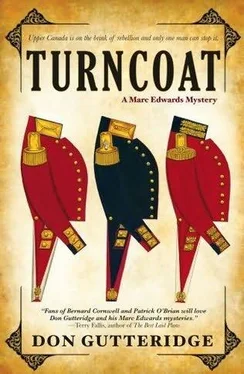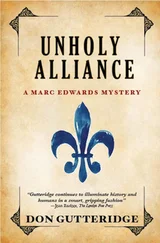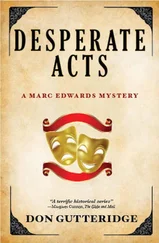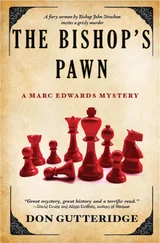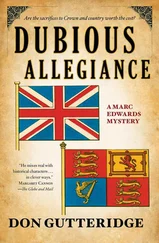Don Gutteridge - Turncoat
Здесь есть возможность читать онлайн «Don Gutteridge - Turncoat» весь текст электронной книги совершенно бесплатно (целиком полную версию без сокращений). В некоторых случаях можно слушать аудио, скачать через торрент в формате fb2 и присутствует краткое содержание. Год выпуска: 2003, Издательство: Simon & Schuster, Жанр: Исторический детектив, на английском языке. Описание произведения, (предисловие) а так же отзывы посетителей доступны на портале библиотеки ЛибКат.
- Название:Turncoat
- Автор:
- Издательство:Simon & Schuster
- Жанр:
- Год:2003
- ISBN:нет данных
- Рейтинг книги:4 / 5. Голосов: 1
-
Избранное:Добавить в избранное
- Отзывы:
-
Ваша оценка:
- 80
- 1
- 2
- 3
- 4
- 5
Turncoat: краткое содержание, описание и аннотация
Предлагаем к чтению аннотацию, описание, краткое содержание или предисловие (зависит от того, что написал сам автор книги «Turncoat»). Если вы не нашли необходимую информацию о книге — напишите в комментариях, мы постараемся отыскать её.
Turncoat — читать онлайн бесплатно полную книгу (весь текст) целиком
Ниже представлен текст книги, разбитый по страницам. Система сохранения места последней прочитанной страницы, позволяет с удобством читать онлайн бесплатно книгу «Turncoat», без необходимости каждый раз заново искать на чём Вы остановились. Поставьте закладку, и сможете в любой момент перейти на страницу, на которой закончили чтение.
Интервал:
Закладка:
Marc held his breath, and his peace.
“Preposterous,” Child said, circulating the cigar box and serving with his own hand a generous round of brandy. He gave the slumbering fire an aristocratic poke with one of the irons.
Hatch became animated. “Not so, Squire. It makes a kind of sense, especially if you were a member of one of the fanatical fringe groups in the Reform party-a Clear Grit or whatever. Think of it from that point of view: a retired dry goods merchant comes into the district, a known Tory and occasional associate of the lieutenant-governor. Suddenly he starts showing up at Reform political dos everywhere with his daughter-in-law, a known sympathizer. Jesse campaigned over in Lennox for Perry, remember, and wrote up a petition that went to Mackenzie and the grievances committee in the Assembly.”
“Aye, that’s quite plausible,” Barnaby conceded, and even Squire Child nodded meditatively.
Marc was buoyed by the drift of the conversation. Here was the one motive for murder he found to be the most compelling and for which he had inside knowledge he could not reveal. And now he would not have to. He tried to appear only casually interested.
“I see your point,” he said, fingering his brandy glass.
“Nevertheless,” Barnaby said, and he paused at the deflationary effect of that word. “Nevertheless, we are still faced with the same sort of question as before. What information would an informer-Joshua in this case-be able to gather, from ordinary political meetings and speeches, that would be seditious enough to pose a threat to some treasonous cause or specific persons espousing it?”
“Exactly,” Child said. He turned to Marc like a wigged justice about to lecture the novice petitioner before his bench. “All you need to do is scan one issue of the Colonial Advocate or the Cobourg Star to realize that no rally, camp meeting, hustings debate, or underground pamphleteering goes unreported for any longer than it takes to set the type. One side inflates the rhetoric with hyperbole and bombast, the other edits and distorts at will-but no one’s opinion, view, prejudice, or bigotry remains private for more than a day in this fishbowl of a province.”
“True,” Barnaby said. “There’s a lot of bush out there, but not a single tree that would hide you for an hour.”
“What we’re saying,” Hatch added, “is that the information would have to be truly seditious-like facts about proposed actions-not the empty-headed threats we see in the press every week.”
For a minute or so the weight of this conclusion silenced the group, and fresh cigars were clipped and lit.
Barnaby spoke first. “I think we’re agreed that truly treasonous information would not likely bubble up at the meetings Joshua and Beth attended last summer and fall. But what if those meetings were not the source?”
“What else could be?” Durfee said.
“You said yourself that Jesse Smallman was treading dangerous waters near the end.”
“I only meant he was flailin’ about-angry, in despair-at what was happenin’ to him because of the Clergy Reserves. And how he kept repeatin’ that there didn’t seem to be any political party capable of gettin’ anythin’ done.”
“Is it possible, conceivable even,” Barnaby continued, “that Jesse joined or thought of joining one of the annexationist groups, one of the secret societies, and that he might have been privy to treasonable information?”
“Now we’re really grasping at straws,” Hatch said.
“The man’s also been dead for twelve months,” Child said.
Barnaby, who was beginning to enjoy himself wholeheartedly, persisted. “What if Joshua discovered this information? Among his son’s effects, for example? And was thought to be an agent as well?”
“You’ve got a surfeit of ‘what ifs’ in that hypothesis,” Child said.
“There’s only one way to find out,” Durfee said. “Only one person is left who can shed any light on Joshua or Jesse.”
“You’re not suggesting Beth might be involved in anything unsavoury?” Hatch said sharply.
“I think he’s merely implying that some of the answers to our questions lie in the Smallman household,” Barnaby said. “For the sake of the reputations of two men no longer able to defend themselves, I think it behooves us to engage in some hard questioning, indelicate as that might prove.”
They all turned to gaze, with expectation and much relief, at Ensign Edwards.
The arrival of Coggins with a tray of cheeses and sweetmeats and decanters of wine stinted the flow of serious conversation for some minutes. However, as soon as the sighs of satisfaction had abated, Philander Child picked up a thread of the previous dialogue.
“While I concur that we must press Mrs. Smallman as forcefully as her delicate circumstances permit in order to eliminate any possibility that Joshua Smallman might have been an informer or that Jesse was anything other than a misguided Reformer, I would advise young Marc here to aim his investigation in more obvious directions.”
“To those in the county already known to be fanatics,” Marc said.
The squire smiled patiently. “My years on the bench compel me to consider facts before hypotheses. Someone has to ascertain, among the living, whether there was any actual contact or real acquaintance between Joshua and known extremists. We need facts, dates, notarized statements, sworn information or affidavits. No one gets himself murdered-and even that assumption is still conjecture, remember-without coming into contact, in some discernible way, with his assassin.”
“So, I need to find out whether any such extremists knew Smallman or were seen with him over the past twelve months.”
“And I can suggest two or three likely candidates,” Child said.
Marc smiled. “Azel Stebbins, Israel Wicks, and Orville Hislop,” he said, recalling these names from Sir John’s notes.
“Sir John has been well briefed,” Child said.
“When will you begin, then?” Durfee said.
Marc smiled. “I already have.”
James Durfee and Charles Barnaby left together shortly after ten o’clock, because the doctor was tired after nine hours in his Cobourg surgery and Durfee wished to help Emma clear up after the chaos of the afternoon stage stop and the brisk evening trade of local elbow-benders.
As the remaining three were finishing their nightcaps, Hatch happened to mention to Child that Marc had manhandled a couple of Yankee peddlers on his way to Crawford’s Corners.
“You are a soldier, young man.” Child laughed appreciatively. “And a damn good one.”
“Marc has reason to think they were involved in smuggling rum,” Hatch said.
“What puzzles me,” Marc said, “is why anybody, peddler or freebooter, would bring tariffed spirits into a province where whisky itself is duty-free and there seem to be more local distilleries than gristmills. Grog’s a penny a cup at every wayside shebeen.”
“A fair question,” Child said, nodding towards Hatch. “But these smugglers are ‘importing’ high-quality spirits and wines: rum from the West Indies, bourbon from the Carolinas, Bordeaux and Champagne from France, port from Iberia-and all of it, you can be sure, pirated or hijacked at some point along the way. They peddle it only around the garrison towns-Kingston, Toronto, London, Sandwich, Newark-to establishments that cater to a higher class of citizenry and that, in addition to cut-price vintage spirits, offer the further comfort of a warm bed and willing flesh.” The squire, long a widower, shook his head sorrowfully, as a man who has seen much folly and never quite accustomed himself to it.
“But that means tuns, barrels, packing cases,” Marc said.
“Oh, the peddlers don’t do the actual smuggling,” Hatch said. “They’re just petty advance men, order-takers, messengers, and the like. Peddling door to door is a perfect cover for the work. The county is crawling with them, summer and winter.”
Читать дальшеИнтервал:
Закладка:
Похожие книги на «Turncoat»
Представляем Вашему вниманию похожие книги на «Turncoat» списком для выбора. Мы отобрали схожую по названию и смыслу литературу в надежде предоставить читателям больше вариантов отыскать новые, интересные, ещё непрочитанные произведения.
Обсуждение, отзывы о книге «Turncoat» и просто собственные мнения читателей. Оставьте ваши комментарии, напишите, что Вы думаете о произведении, его смысле или главных героях. Укажите что конкретно понравилось, а что нет, и почему Вы так считаете.
